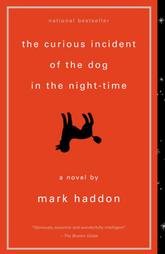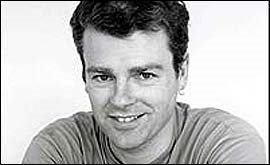Hell in a very small place...

The Curious Incident of the Dog in the Night-time
by Mark Haddon
I try to read "outside the box." Even so, only a handful of the books I read are worth touting to other readers. Mark Haddon's The Curious Incident of the Dog in the Night-time is one of those.
The narrator: A fifteen year old autistic boy. Nah. Other than my own, I'm not particularly fond of children. Most of the people who have them shouldn't. I'm not going to read this book.
Well, wait, some of my favorite books are narrated by boys. Catcher in the Rye. Huckleberry Finn. Some Dickens stuff. Maybe I'll read a few pages.
So in the beginning our hero, Christopher Boone, finds his neighbor's dog "murdered" with a garden fork and decides to find out who did it. Not exactly the most compelling plot line I've ever seen. I should stop reading here. But there's something about the writing that keeps me going.
In no time at all, I'm fifty pages in and committed to the finish. Why? Christopher's autism is maddening. He spends a lot of time kneeling on the floor or in the grass with his head pressed to the surface, moaning. You want to give him a good smack on the head and say "Suck it up, boy." His mother does. That leads to one of the central problems of the novel. His father is a dull, unimaginative, accomodating plumbing contractor, who believes that whatever Christopher wants should be acceded to. Most of the remaining characters are barely sketched in cardboard cutouts. So why am I still reading?
Part of it is Mark Haddon's writing. Spare, precise, minimalist, but blessed with a superb internal rhythm that feels just right. But mostly it's about being allowed to see the world from Christopher's perspective, which is not the perspective that most of us are familiar with, at least on a conscious level. Most people, especially in the United States of America, tend to think that their world view is the average world view. Christopher is acutely aware that his view is not. And along the way, he manages to demonstrate that the views of "the rest of us" are not, either.
Christopher has problems with certain colors, yellow and brown in particular. His caregivers find these problems to be, themselves, a problem. Pop culture goes in the other direction. One of the standard questions addressed to cultural icons for the purpose of published profiles is "What is your favorite color?" Meaningless, but required. Better to ask them what colors turn them off. Ask any truly sophisticated graphic designer. They know. What color turns this demographic on. What color turns them off. What turns them off is much more important than what turns them on. The one thing that is certain is that most people have no idea about this. But Christopher does.
Christopher has problems with being touched. On page six, he says "Then the police arrived. I like the police. They have uniforms and numbers and you know what they are meant to be doing." But on page eight "The policeman took hold of my arm and lifted me onto my feet. I didn't like him touching me like this. And this is when I hit him." I grew up in a world where people rarely touched each other. My ex-wife grew up in a world where hugging, even cheek kissing, was a way of greeting. Imagine how tense our family get togethers were.
Christopher has problems with anything that departs from his daily routine. Going out in public. Finding any place that he's never been to before. Dealing with people who are not "family or friends." His experiences are intense, but are they that different from those of most of us?
All of these themes and more are thoroughly developed in the first half of the book. Then things start breaking and racing out of control downstream. I wouldn't dare to even hint at what that entails. Read this book. You won't be sorry.

Mark Haddon

2 Comments:
Read this, wanted to smack the kid around, tell him "get with it," but only because I was him. Thanks.
I teach kids like this every day. Unfortunately I'm not trained to deal with them, so despite making a huge effort, I find myself frustrated.
Human Arts Teacher
Post a Comment
Subscribe to Post Comments [Atom]
<< Home